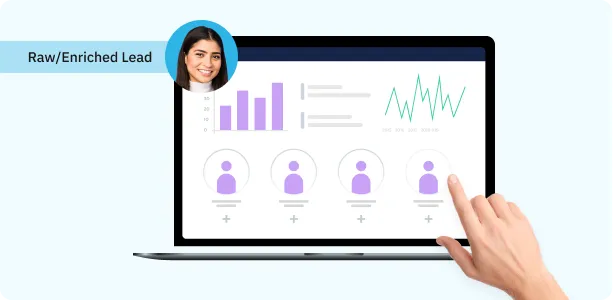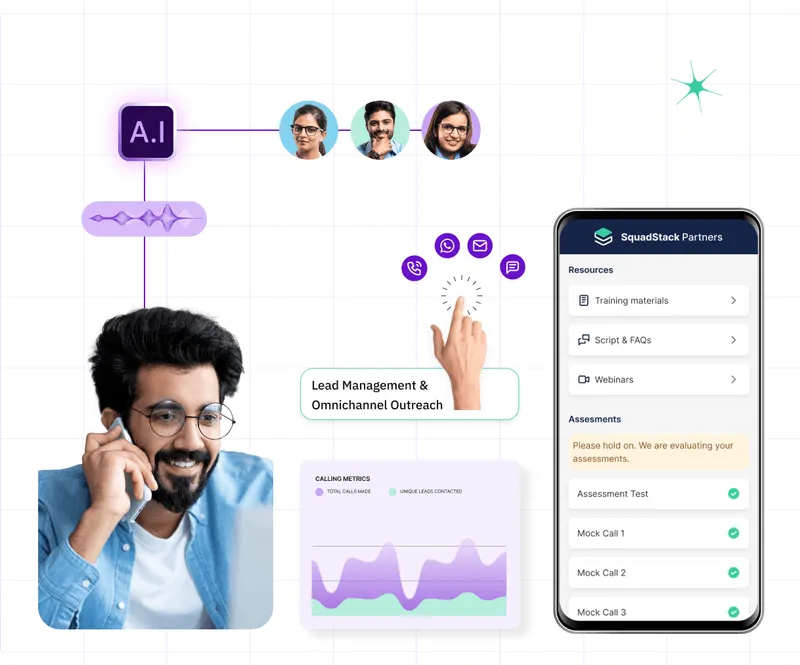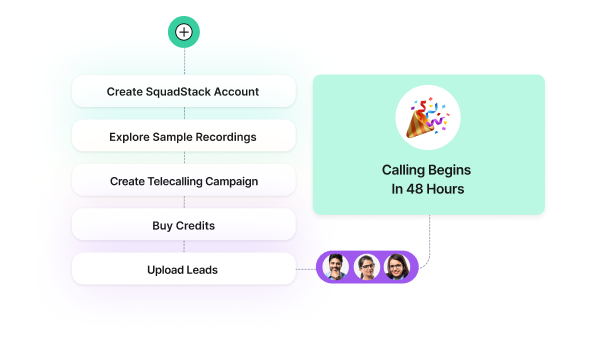Automate your sales processes and improve customer experience
using the best lead management software.
Lead management is a part of the sales process that allows businesses to identify, attract, capture, and convert prospects into potential customers. This process helps to track the journey of a buyer from its inception.
Lead management is a crucial function in any organization, as it helps them increase sales, acquire new customers, and create a funnel of prospects who can be targeted for future products and services.
Lead management software streamlines and automates all the processes used to manage leads throughout the sales and marketing pipeline. The primary goal of this software is to help businesses capture, track, nurture, and convert leads into customers.


Capturing Leads: Capturing leads requires identifying and gathering information about individuals or organizations that have expressed interest in your products or services.The primary goal of lead capture is to convert these prospects into actionable opportunities for sales and marketing teams to pursue. Read More
Lead Tracking: Lead tracking systematically monitors and analyzes prospects' interactions and engagement with a company's marketing and sales team efforts.It involves capturing data points such as website visits, email opens, content downloads, social media interactions, and responses to communication channels like phone calls or live chats. Read More
Lead Qualification: Lead qualification is assessing the readiness and suitability of potential leads before they are passed on to the sales team for further engagement.The goal of lead qualification is to ensure that only high-quality, sales-ready leads enter the sales pipeline, thus maximizing the efficiency of the sales process and increasing the likelihood of conversion. Read More
Lead Scoring: Lead scoring is a methodology sales and marketing teams use to evaluate and rank leads based on their likelihood of becoming customers.In this process, a numerical value, or score, based on various attributes and behaviors, helps prioritize leads for follow-up and nurturing efforts. Read More
Hubspot CRM is a popular choice and specialises in both inbound and outbound customer communications.
Clean dashboard with advanced data analytics features
Suitable for beginners to learn essential CRM functions for free.
It offers customisation and other vital features such as deal pipeline management, conversation intelligence, E-mail tracking, etc.
Hubspot offers limited features in the free version. Users must subscribe to the premium version for advanced functions.

Zoho CRM is a cloud-based software that focuses on data analytics and security. It offers all the vital lead management tools, such as sales report analytics, pipeline management tools, lead scoring, and integrated communication channels.
Zoho CRM has competitive pricing and is suitable for small and medium-scale businesses.
It has a user-friendly interface, gives access to various lead management tools, and can be integrated with other Zoho tools.
The advanced features of the CRM are limited only to higher-tier plans.
The CRM lacks certain features, such as built-in telephony.
Customizations are needed as per business requirements, which are complex.

Pipedrive allows users to customize and create many pipelines to capture and manage lead data. To facilitate these new pipelines, Pipedrive provides AI chatbots, which can make conversations with customers to solve their queries.
Pipedrive offers competitive pricing and is affordable for most small businesses.
Offers great customization and sales pipeline management
The pipeline needs advanced features such as lead scoring, sales sequence, etc.

Zendesk is a sales and lead management solution that provides all-around service. Their CRM software includes a complete package of productivity tools, a pipeline management system, and data analytics tools.
Zendesk is feature-rich software encompasses e-mail tracking, workflow automation, customizable dashboards, app integration, etc.
Many features are locked and can force businesses for expensive plans than initially anticipated.

Monday CRM is a complete lead management solution for your business, as it offers various services involved in lead generation, marketing, customer onboarding, sales pipeline, etc.
Various customizable templates customize your sales and lead management dashboards for easy navigation.
It allows multiple users to work and edit a single list; this makes the entire process more collaborative.
The software uses per-user pricing, and adding users with complete collaborative permissions leads to more costs.

Salesforce is a pioneer and one of the biggest brands in the SaaS space. It offers one of the most advanced cloud-based CRM systems, which caters to businesses of all sizes. Their products can be highly customized and integrated with most telecalling software.
It is is a feature-rich software, with all the significant features, such as forecasting, workflow management, data analytics, lead tracking, etc., present with the software.
It offers a complete 360 package with other ancillary tools such as marketing, sales, and CRM solutions.
The CRM is quite expensive for many small businesses.
Set-up and overall implementation costs include the subscription fee and significant expenses related to software configuration and deployment.

The main strength of Copper as a CRM or lead management tool lies in its seamless integration capabilities, designed to enhance user experience. Customizable and integration-focused, Copper effortlessly integrates with various communication software, notably Gsuites and Google Workspace.
Copper CRM has all the key features of a CRM, with tools such as workflow management, sales analytics, and even marketing solutions.
The CRM is easy to use and can integrate smoothly with G-Suites.
The CRM is focused on G-suite integration, so if a business is based on some other communication/ workplace solution, then they would need help in integrating this CRM.

Bitrix24 offers online CRM and various sales tools integrated with the software beforehand. Bitrix24 also provides automated workflows to automate the process of managing and tracking the lifecycle of leads.
Some of the most critical features of CRMs, such as sales dashboards, workflow automation, analytics, lead tracking, etc., are available in bitrix24.
The free version of the Bitrix24 CRM has a decent amount of features and also offers collaboration in the free version.
The automation and other important features are only available in the higher-paid versions; thus, they are not accessible to every small business.

SquadStack allows businesses to easily integrate the CRM of their choice with our telecalling platform. You can import leads through any CRM or manually import them into our platform. Once the leads are imported, our lead management system takes over and smoothly guides your leads through our telecalling platform and toward conversion. Let's understand what SquadStack has to offer when it comes to lead management

Once leads enter our system through customer CRMs or manual imports, they go through a checker system. This ensures we adhere to calling regulations. We check for duplicates and DND numbers to ensure no one gets spammed. Read More

We accurately segregate leads on the basis of age, demographics, geography, profession, product interest, etc. We also use concepts such as Last-in-first-out and First-in-last-out to maintain workflow and desired turnaround times. Read More

Once the leads are prioritized according to their segmentation, they flow through our workflow system. SquadStack's workflow system is highly customizable and can be configured on multiple touchpoints as per the requirements of the business. Read More

One of the key processes that helps us increase our conversion rates is our lead matching system. Here, we match leads according to the skills of the agents. This way, we optimise the chances of success. Read More

At SquadStack, we try to maintain a connectivity rate by ensuring our resources are utilised efficiently, and our lead conversion rates are high. We achieve this by removing spam numbers with the help of our systems and performing tests to figure out the best time and day to approach leads. If the connectivity rate falls below a certain limit, our system will automatically detect the fault and try to fix it accordingly. Read More

Our systems allow businesses to track the entire lifecycle of a lead from the time their contact details were acquired till the time they became a paying customer. This allows businesses to understand trends and figure out which strategy to apply to increase lead conversions. Read More
SquadStack offers various call center services, along with lead management and omnichannel outreach. With SquadStack, businesses can avail a pre-trained, industry-ready distributed workforce of 5000+ callers present across India to:
Connect with leads and customers via omnichannel like Voice, SMS, IVR, and WhatsApp.
Scale with flexibility during seasonal demands with our usage-based pricing model.
Best in market connectivity
Top-notch call quality analytics


At SquadStack, we offer a plug-and-play solution where you can follow some simple steps and get your telecalling campaign started in 48 hours.
Setup SquadStack account
Explore sample recordings
Create a telecalling campaign and scripts
Upload leads
Let us handle the rest
Lead management is integral to business operations and essential for effectively managing leads and maximizing conversion rates. A well-implemented system streamlines identifying and nurturing leads, ensuring that businesses can prioritize resources and focus on the most promising prospects. By leveraging strategies, companies can efficiently handle leads from various sources, improving efficiency and enhancing communication between sales and marketing teams.
With the best lead management software, companies can target priority leads efficiently and make sure everything runs smoothly. Identifying at what step of the sales funnel the leads are getting dropped is a crucial indicator of the problems arising in sales processes. By identifying these problems, companies can work towards finding solutions and manage leads effectively.
Managing sales opportunities for BPOs and call centers involves creating transparent processes, implementing a CRM system, and providing training to agents. This process includes lead capturing, qualification, performance, and tracking, all of which help improve lead management and ensure consistency in lead retention.
Businesses can centralize data, track interactions, and automate tasks using a CRM system, improving efficiency. Train call agents and BPO staff on management best practices so they have the knowledge and skills necessary to communicate effectively with buyers' qualified leads and know how to use CRM tools.
CRM leads are potential customers or prospects who have expressed interest in a company's products or services and are managed within a Customer Relationship Management (CRM) system.
These leads are generated through website inquiries, social media engagement, email subscriptions, or offline events. Once captured, CRM leads are categorized, tracked, and pursued by sales and marketing teams to guide them through the sales funnel toward conversion.
Here are some of the processes associated with lead management.
Sales and marketing activities that initiate lead generation are different from the process of capturing and tracking leads. Several methods must be used to integrate the manufacturer's work with sales. An integrated platform that includes essential elements like location and event name.
Tracking involves monitoring a variety of activities of potential customers, such as the pages they visit on the web, their interactions with emails, and their responses to communication through phone calls, text messages, or channels such as WhatsApp.This tracking is essential to remember the details when you return.
Many sales (about 67%) are lost due to a lack of effective leads. Improper lead qualification occurs when a lead who is not ready to sell enters the funnel. Therefore, potential customers need to be qualified according to their needs, purchases, and products that will meet their needs.
Distribution strategies assist in this process and allow routing to the right vendor based on predefined criteria such as geographic region or product interest. Leaders ensure coordination and collaboration, ensuring that all team members have access to critical management information.
Lead nurturing is developing relationships with potential leads and converting them into qualified leads.
A Lead represents a potential customer who has first shown interest in the product or service offered by a business but has yet to make a purchase. Leads typically get the product idea through various marketing channels, such as advertisements, promotions, or website visits.
Customers like to pay customers by purchasing the business's products. When potential customers complete a transaction, they become customers and interact with the industry as buyers. The customer has gone through the entire sales process, including awareness, evaluation, and decision stages, and has committed to purchasing the product or service. Customer satisfaction and retention are top priorities for businesses trying to maximize the value of their customers.
Furthermore, lead management gives businesses valuable insights into customer behavior and preferences. Companies can better understand their target audience by analyzing lead data and tracking their interactions with the industry. This allows for more personalized marketing and sales efforts tailored to meet potential customers' needs and expectations.
Here are some of the best lead management software:
Offers inbound and outbound communication features.
Clean dashboard with advanced analytics. The free version has limited features; a premium subscription is needed for advanced functions.
Cloud-based with a focus on data analytics and security.
Competitive pricing is suitable for small to medium businesses.
Advanced features are limited to higher-tier plans; customization can be complex.
Allows customization and creation of multiple pipelines.
Provides AI chatbots for customer conversations.
Lacks advanced features such as lead scoring.
All-around solution with productivity tools and data analytics.
Features locked behind expensive plans.
Comprehensive service but may require significant investment.
Offers customizable templates and collaborative features.
The per-user pricing model may become costly.
Suitable for lead generation, marketing, and sales pipeline management.
Feature-rich CRM with extensive capabilities.
Expensive for small businesses; high setup and implementation costs.
Offers 360-degree packages with ancillary tools like marketing and sales solutions.
Excels in seamless integration with G-suite.
Offers key CRM features and a user-friendly interface.
Focused on G-suite integration; may require assistance for other platforms.
Online CRM with integrated sales tools and automation.
The free version offers decent features, and advanced features in higher-paid versions.
Collaboration features are available even in the free version.
Key performance indicators (KPIs) for lead management are metrics used to measure the effectiveness and success of your leads, as well as promotion and qualification efforts. These KPIs provide information about the performance of the management process and help businesses identify areas for improvement. Some of the lead management KPIs include:
Lead generation rate: Measuring the number of leads generated over some time shows how marketing campaigns and strategies will attract leads.
Lead Quality: Assess lead quality based on demographics, behavior, and engagement to ensure the sales team targets suitable leads who are likely to change.
Conversion rate: It shows the effectiveness of the sales process in converting into revenue by calculating the percentage of customers who successfully turn into potential customers.
Lead Velocity: Track how quickly leads come through the sales pipeline, showing how you can quickly convert and identify opportunities in your sales process.
Cost per Lead: Help businesses measure the effectiveness of marketing and advertising-related investments in lead generation by measuring the cost required to generate leads.
Lead Engagement Metrics: Includes email open rates, click-through rates, and web-sharing metrics to provide insight into lead engagement and interest rates.
Sales Lifecycle: Help departments increase the efficiency and effectiveness of the sales process by tracking the average time it takes for a potential customer to succeed through the sales channel and become a customer.
Churn Rate: Measure the rate of churn or withdrawal from the sales process before conversion, highlighting areas that need improvement in leadership and strategy tracking.
Return on Investment (ROI): Helps businesses evaluate the benefits and effectiveness of sales practices by calculating the return on investment compared to operations management.
Adopting a lead management system provides many benefits to small businesses:
Organizational development: Helps businesses centralize lead information in one place, making it easier to manage sales overall. Checking applications and control processes throughout the process saves time and reduces manual work, allowing small businesses to focus on various activities and increase efficiency.
Better track and monitor: With social media management, small businesses can track and monitor interactions and network engagement and better understand behavior and preferences.
Improving Costs of Sales: A lead management system helps small businesses focus on those most likely to convert by providing top-notch leads as a preliminary process, such as ratings or engagement levels for leads, thereby improving sales efficiency and driving sales growth.
More accessible communication: Functional management systems improve communication and collaboration between sales and marketing teams by providing a platform for data sharing, tracking of interactions, and post-transaction collaboration.
Customer Development: It can help small businesses deliver a better customer experience and increase customer loyalty, satisfaction, and trust by ensuring timely communication and coordination.
CRM (Customer Relationship Management) lead management differs from traditional management systems in several important ways:
Data Centralization: CRM management systems provide standard lead information management on a single platform. It allows businesses to store, organize, and access lead information. In contrast, traditional management systems rely on manual systems or processes, resulting in timely and consistent information.
Integrated communication: CRM lead management system integrates various communication methods such as email, phone, and social media, as well as web chat. This integration allows businesses to track and manage customer interactions across multiple interactions, providing a comprehensive view of the customer journey. Traditional lead management systems may need this integration, making tracking and managing lead interactions easier.
Automation and Workflow Management: CRM systems provide automation and workflow management capabilities that allow businesses to improve lead capture, scoring, maintenance, and follow-up procedures. Automation streamlines workflow, increases efficiency and ensures timely communication that is consistent with expectations. Lead management often relies on manual processes, resulting in efficient and consistent management practices.
Potential Customer Scoring and Segmentation: CRM lead management systems provide scoring and segmentation capabilities that allow businesses to prioritize potential customers based on their profiles and convert them into various groups or potential market segmentation. This will enable businesses to focus on high-performing individuals and adjust their marketing and sales strategies accordingly. Traditional lead management systems may not have scoring and segmentation capabilities to ensure the best possible prioritization and targeting.